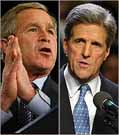Saturday, October 23
Staying or Going? Some Possibilities if Bush Wins
By Mike AllenWashington Post, October 22, 2004
President Bush plans major changes in his Cabinet if he wins a second term -- perhaps nominating the first female defense secretary and first black attorney general -- but very little change among the small group of his closest advisers.
Public talk about the second-term lineup is verboten around the White House, since officials realize it would look presumptuous and even foolish with the race so close. But Chief of Staff Andrew H. Card Jr. and senior adviser Karl Rove have a mental list of likely switches, according to colleagues, and people close to the White House are chattering about the possibilities.
Many are speculating that Defense Secretary Donald H. Rumsfeld would depart if Bush defeated John F. Kerry, although perhaps after he remained a while longer in hopes of seeing improved conditions in Iraq. Rumsfeld's likely replacement? Condoleezza Rice, the president's national security adviser, who would be the first female Pentagon chief.
According to Republicans, the most logical successors to Rice would be Deputy Secretary of Defense Paul D. Wolfowitz, an architect of the Iraq war who might be chosen if Bush were feeling vindicated; I. Lewis Libby, chief of staff for Vice President Cheney; and Rice's current deputy, Steven J. Hadley.
Secretary of State Colin L. Powell, who has repeatedly been cut out of major decision making, surprised some Washington speculators this summer by suggesting he might stay on. One possible replacement would be former senator John C. Danforth (R-Mo.), who was a finalist to be Bush's running mate in 2000 and who is now the U.S. ambassador to the United Nations.
Friends say that Attorney General John D. Ashcroft realizes he would be unlikely to be asked to stay on. The president has hinted he would be interested in hiring Larry D. Thompson, Ashcroft's former deputy. Thompson would be the first African American to hold the job.
... ...
There is little doubt that Karl Rove, White House senior adviser and the chief architect of Bush's reelection campaign, would remain in his job, provided his election strategy succeeds.
Communications director Dan Bartlett, another member of the White House's Texas mafia, is so close to the president that his influence does not depend on his title. Insiders say he could fill a variety of jobs, including his current one.
[...more]
..............................
Behind Bush's Rhetoric
By E. J. Dionne Jr., Washington Post, October 22, 2004;
What does the war on terrorism have to do with the privatization of Social Security and the possibility of a national sales tax?
Nothing. And everything
In the final days of this campaign, voters have to consider not just whom they should vote for but also how their votes will be used by those they elect.
President Bush wants to win by twisting and distorting John Kerry's record on terrorism. Bush proposes to win by persuading the persuadable that in a time of danger, it's safest to stick with the guy in power.
But Bush also has a remarkably broad agenda to change the Social Security and tax systems. He's not big on the specifics. Yet if Bush is reelected, he will claim a domestic mandate that will come as a surprise to many who voted for him.
We know this because Bush lacked a policy mandate in 2000 -- he didn't even win the popular vote -- and nonetheless pushed through two rounds of tax cuts tilted to the wealthy that have built those staggering long-term deficits.
In 2004, voters should pay attention to the mandate behind the curtain.
Begin with Bush's distortions of Kerry's record on terrorism.
 Here's Bush in Mason City, Iowa, on Wednesday: "Senator Kerry was recently asked how September the 11th had changed him. He replied, 'It didn't change me much at all.' And this unchanged worldview becomes obvious when he calls the war against terror primarily an intelligence and law enforcement operation, rather than what I believe: a war which requires the full use of American power to keep us secure."
Here's Bush in Mason City, Iowa, on Wednesday: "Senator Kerry was recently asked how September the 11th had changed him. He replied, 'It didn't change me much at all.' And this unchanged worldview becomes obvious when he calls the war against terror primarily an intelligence and law enforcement operation, rather than what I believe: a war which requires the full use of American power to keep us secure."
By taking seven of Kerry's words out of a much longer statement, Bush twisted his opponent's position beyond recognition. Here is journalist Matt Bai's account, in the New York Times Magazine article Bush was citing, of what Kerry actually said when he was asked how Sept. 11 had changed him:
"I mean, it didn't change me much at all. It just sort of accelerated, confirmed in me, the urgency of doing the things I thought we needed to be doing. I mean, to me, it wasn't as transformational as it was a kind of anger, a frustration and an urgency that we weren't doing the kinds of things necessary to prevent it and to deal with it."
Bai added: "Kerry did allow that he, like other Americans, felt less safe after 9/11."
Not exactly the guy Bush described.
But if Bush will say whatever it takes about terrorism to win reelection, what will he do with his victory?
[...more]

